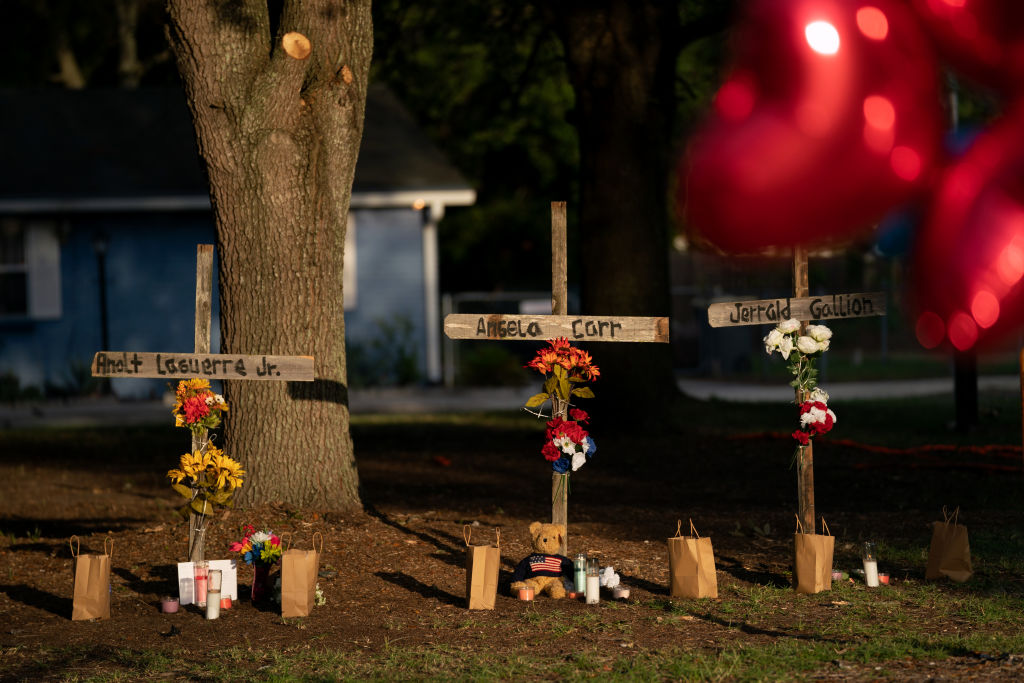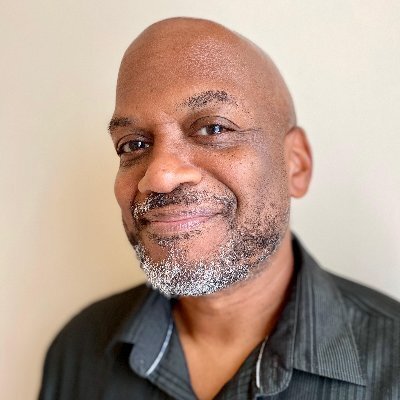No, the Jacksonville mass murder was not ‘racially motivated.’ It was racist.
OPINION: When the media refuse to call out racist violence for what it is, they fail to educate and inform the public on the true nature of racism, and in reality, inflict harm by promoting a narrative that whitewashes racism for white public consumption.

Editor’s note: The following article is an op-ed, and the views expressed are the author’s own. Read more opinions on theGrio.
Words matter. And news people, get the term “racially motivated” out of your mouth.
With every act of mass murder by a white supremacist shooter, the news media provide a window for us to appreciate the cluelessness of many journalists, reporters, writers and editors on the issue of racism. When a 21-year old white gunman killed three Black people at a Dollar General store in Jacksonville, Florida — after attempting to enter and being turned away from Edward Waters University, an HBCU — many news reports said the mass shooting was “racially motivated.”
Nikole Hannah-Jones, the New York Times journalist, professor and creator of the 1619 Project, challenged us to do better and be better, tweeting: “Journalists: the Jacksonville mass murder was not racially motivated violence, it was RACIST violence. We must be specific and direct with our language.”

Something is wrong with white people
As a Black man and journalism and media studies professor who thinks a great deal about the role and reporting of racism in the media, I agree with Hannah-Jones. Using wishy-washy and meaningless language to describe acts of racist violence fails to educate and inform the public on the true nature of racism, and in reality, inflicts harm by promoting a narrative that whitewashes, launders and disinfects racism for white public consumption.
Euphemisms in news reporting such as “racially motivated,” “racially tinged” and “race-based” reflect a reluctance or even a refusal of journalists to confront the issue of racism head-on, much less name it. Terms like “racially motivated” neutralize racism and turn it into an abstraction. Racism becomes something that may or may not exist in the heart of an individual person and is separated from institutions of oppression, white power, hierarchy and privilege. When divorced from the violence that is inflicted on Black people by white structures of power, racism becomes some vague concept that is perceived as no big deal, and often exaggerated and overblown by Black people.
Meanwhile, this soothing language on racism not only makes racism neutral, it also ignores the role of race-baiting politicians, public figures and media personalities, stochastic terrorists and arsonists like Florida Gov. Ron DeSantis who create the environment that facilitates these racist mass murders.
Glaring and conspicuous acts of racism should be identified for what they are, and there is academic literature and historical research for journalists to draw upon. However, much of the media industry is not up to the task. Hence, the importance of Black media such as theGrio to provide an unadulterated view on such issues.
America’s newsrooms are overwhelmingly white, despite the country’s increasingly melanated demographics. News organizations should rely more heavily on Black sources and other sources of color in their reporting, seek diversity, equity and inclusion in their staffing to create a better and more reliable media product, and train journalists — including white journalists — in racial literacy.
A white-dominated news industry does not want to face up to racism because much of white America does not want to deal with the impact of racism and does not have to in any case. In the way that white supremacist politicians neutralized their language in colorblind terminology in the post-civil rights era — replacing the n-word with talk about states’ rights, taxes, welfare, and most recently “woke” and the like — news media followed suit. As a result, racism did not go away but was normalized and mainstreamed as a legitimate viewpoint in the public discourse. And the threat of racism was magnified even as it was swept under the rug through language.
Part of the problem is the eagerness of news organizations to prove they are objective — whatever that means. News organizations engage in a form of performative neutrality to give the impression they are reporting straight down the middle and not showing favoritism to any particular political side. The problem with this “both sides” approach is what passes for objectivity is defined by the values of white editors and reporters, with the goal to avoid offending white readers.
This reminds me in many ways of the current push by white conservatives to ban books, courses and other materials in schools that could trigger white children and bring discomfort to snowflakes. Just as white children are shortchanged by a whitewashed education devoid of Blackness, so too are white readers ill-served when the “news” they read is a carefully engineered land of make-believe where racism doesn’t exist.
Rather than strive for objectivity, journalists should strive for the truth, as I teach my students at Rutgers. Many stories have more than two sides. Some have multiple sides, and others have one. But seeking a middle ground between racial justice and democracy on the one hand and racism and white supremacist violence on the other is not journalism. I don’t know what that is.
Relegating racist violence to a few gun-toting neo-Nazis who write manifestos ignores the current political and social environment, where white people, particularly white men, are encouraged to feel like they are the aggrieved in society, that they are the true victims. As young white men are radicalized online to form the greatest threat to America — white domestic terrorism — politicians such as DeSantis wage a war on the “woke” and punish Black people through harmful policies in education, civil and voting rights, criminal justice and the like. These policies and laws offer a wink and a nod to the white supremacists to wave Nazi flags at Walt Disney World and beam swastikas on Jacksonville buildings, inflict violence on Black people and take Black lives in the dollar store.
Things have become so bad in Florida that earlier this year, the NAACP issued a travel advisory for Black people “in response to Governor Ron DeSantis’ aggressive attempts to erase Black history and to restrict diversity, equity, and inclusion programs in Florida schools.” It is no wonder that the Jacksonville mass shooting took place in this environment.
If the news media are failing to do their job and report effectively on racism and racist violence, there are solutions. For example, the AP Stylebook tells journalists not to use “racially charged,” “racially divisive,” “racially tinged” or similar terms that have little meaning when “racist” or “racism” apply to the situation. And when you call out racism, provide context to help readers understand.
Without reporting on this larger context of racism in America, journalists are committing malpractice. And no one is served except racists when an act of white supremacist domestic terrorism is brushed off as a “racially motivated” shooting.

David A. Love is a journalist and commentator who writes investigative stories and op-eds on a variety of issues, including politics, social justice, human rights, race, criminal justice and inequality. Love is also an instructor at the Rutgers School of Communication and Information, where he trains students in a social justice journalism lab. In addition to his journalism career, Love has worked as an advocate and leader in the nonprofit sector, served as a legislative aide, and as a law clerk to two federal judges. He holds a B.A. in East Asian Studies from Harvard University and a J.D. from the University of Pennsylvania Law School. He also completed the Joint Programme in International Human Rights Law at the University of Oxford. His portfolio website is davidalove.com.
TheGrio is FREE on your TV via Apple TV, Amazon Fire, Roku and Android TV. Also, please download theGrio mobile apps today!

